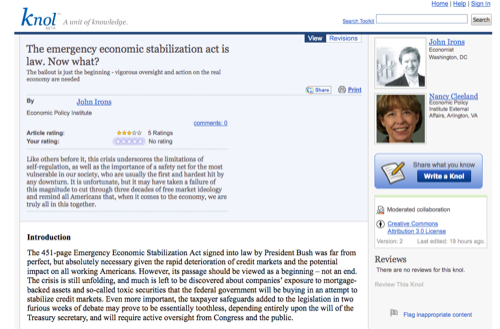When Google launched its sanitized version of Wikipedia, called Knol, earlier this year – the topics highlighted were all pretty mundane. Medical conditions, backpacking, etc. Today the company put Knols to good use and used the site to launch the first in a series of debates about topics of widespread general interest.

The aftermath of the US financial bailout bill is the first topic discussed.
Economists from the conservative Cato Institute and the liberal Economic Policy Institute (EPI) have posted differing opinions as Knols. Now readers can post comments and in theory, recommend changes to the text. (Good luck with that.) This is just the first of several debates Knols will host in the handful of weeks leading up to the US Presidential election. It’s a smart move by Google, both politically and economically.

Why the Knols Debates Are Politically Smart
Google is a company that finds itself taking political stands some times. Last week the company took an official stance against a California bill that would ban gay marriage. On the other hand, earlier this year it colluded with Chinese government censors by removing images of Tienanmen Square from its search results, arguing that engagement is the best way to foster change in a repressive regime and legal compliance is required in order to comply. “We have to do business with them in order to encourage change on human rights” is a convenient argument that’s been made since at least the days of the South African boycott over apartheid. In some circumstances it might also hold some water as an arguement.
For Google to host a long-form point-counterpoint debate about key issues, using simple software that allows readers to participate through comments, is good for Google and good for the public. Google needs to come across as impartial at every opportunity. Otherwise it’s omniscience will become all the more unpalatable.
Most topics do have more than 2 important perspectives from which they should be addressed and we hope that the best comments from readers will be effectively highlighted, as well. Just as a two party political system hampers the intellectual honesty of our engagement with vital public issues, it would be a real loss if the Knols debates were similarly focused on a crude bipartisan analysis of complex topics.
It’s a Good Business Move by Google
Speaking of impartiality, there has been a fair amount of evidence since day one that Knol is doing unusually well in Google search results. Who can be surprised? Some people wouldn’t object if a relevant Knol was automatically placed at the very top of any search result page that it could be.
The problem with that is that Wikipedia pages are often in that position today due to extensive inbound links. Knol truly is aimed to be a Wikipedia killer and Google would no doubt profit handsomely by making its own content pages the go-to sites for matters of public concern.
What better topics to do that with than hugely popular controversies leading up to the Presidential election? These Knols will probably be read by millions of people and in the process of becoming more educated, they will also be exposed to Google’s Knols site.
Last night we wrote about how Google Search and analytics have changed the phenomenon of political debate forever. This giant knowledge conglomerate publishing its own debates as content is likely to be a much more subtle influence on politics, but it could be an important one, none the less.

















